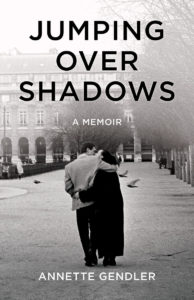A version of this Q&A originally appeared in The Practicing Writer (May 2017).
Revision, Relatives, and Writing One’s Own Love Story: Q&A with Annette Gendler
By Erika Dreifus
Annette Gendler is the author of JUMPING OVER SHADOWS, a new memoir of a German-Jewish love that overcame the burdens of the past. Although Annette and I attended the same MFA program, we did not overlap there; I became acquainted with Annette and her work online; I admired her essays for TABLET MAGAZINE in particular. When I learned that her memoir would be published, I invited her to participate in a Q&A.
Annette Gendler’s writing and photography have appeared in the WALL STREET JOURNAL, TABLET MAGAZINE, BELLA GRACE, and ARTFUL BLOGGING, among others. Annette served as the 2014–2015 writer-in-residence at the Hemingway Birthplace Home in Oak Park, Illinois, and has been teaching memoir writing at StoryStudio Chicago since 2006. Born in New Jersey, she grew up in Germany and lives in Chicago with her family.
Please welcome Annette Gendler!
 ERIKA DREIFUS (ED): In your book’s acknowledgments section, you cite one of your MFA thesis readers, who told you: “The story of the past is only interesting in as far as it resonates in the present,” and you suggest that “without his urging, [you] would not have embarked on telling [your] own story,” because you found the stories of your great-aunt and your grandparents “interesting enough.” Was this truly an “aha!” moment – did you immediately embark on re-shaping the book? Or were there other moments, motivations, models that helped you create what became JUMPING OVER SHADOWS?
ERIKA DREIFUS (ED): In your book’s acknowledgments section, you cite one of your MFA thesis readers, who told you: “The story of the past is only interesting in as far as it resonates in the present,” and you suggest that “without his urging, [you] would not have embarked on telling [your] own story,” because you found the stories of your great-aunt and your grandparents “interesting enough.” Was this truly an “aha!” moment – did you immediately embark on re-shaping the book? Or were there other moments, motivations, models that helped you create what became JUMPING OVER SHADOWS?
ANNETTE GENDLER (AG): It indeed happened like this! My MFA thesis was a collection of essays that explored what had happened to my grandparents and great-aunt in Czechoslovakia before, during, and after WWII. At the time I was mainly interested in how their loss of their homeland had resulted in the subsequent “homelessness” of my father’s generation and mine. I did not intend to write my own story despite it being undeniably dramatic. I sat on my advisor’s advice until I gave it a try during a residency at the Virginia Center for the Creative Arts. Following Hemingway’s method, I told myself to write at least 500 words a day and at the end of that residency, I had a rough draft of what would become the second narrative thread in JUMPING OVER SHADOWS – namely my own story.
ED: Please tell us a bit about how your family members – especially those who figure prominently in JUMPING OVER SHADOWS – have reacted to it.
AG: I didn’t even shop the manuscript around until my husband had read and okayed it, and I made whatever changes he wanted me to, which were all minor. My two older children read the book and my younger son will read it soon, I’m sure, mainly because people keep asking him about it. My daughter is a terrific editor, and she reviewed the manuscript after I did a major rewrite in the summer of 2015. Quite often she scribbled notes like “That’s so Dad!” on the margin that were great affirmations to me – I had gotten him right. My older son found the book “very interesting” and claims the most important thing he learned was that you don’t have to tell your parents everything. That’s definitely an unintended consequence!
Sadly, no one of the older generation is still alive so I could not get their input. I was most apprehensive about how my brother and sister would react, because they knew the older generation and had their own relationships with these people. That history was also their history. Thankfully, they both love the book and are happy to have our family history presented in this way, but they were also gracious enough to recognize that it was my version of the story and theirs might be different. My brother, who’s a graphic designer in Austria, has helped design a lot of my marketing materials and also had input on the cover design, so to him the book’s success is a shared project.
ED: Biggest challenge in the writing of this book? Biggest surprise?
AG: Biggest challenge: Writing my own love story! How do you do that without being soppy? Biggest surprise: Discovering a plausible reason for my great-grandfather’s suicide while doing my research.
ED: Please tell us how JUMPING OVER SHADOWS came to be published by She Writes Press. And perhaps a bit about your experience working with them.
AG: I shopped the book around for three years, trying to find an agent or a publisher. I had many nibbles, requests for the manuscript, but no takers. Then an editor at Algonquin said she’d be willing to consider it again if I took out a lot of the history. The manuscript was, in her opinion, “too historical.” I balked at that, a) because I love the historical stuff and I had done a lot of research, b) I was loath to change the book for someone who had no skin in the game. I was also, frankly, scared to attempt a rewrite. See my essay Rejection vs. Failure (http://booksbywomen.org/rejection-vs-failure-by-annette-gendler/) on this.
Eventually I did rewrite the book. Of course Algonquin didn’t take it, but I had a better book. Then I got an offer from an academic press but She Writes Press (SWP) was already on my radar because one of my students, Kelley Clink, had published her memoir A DIFFERENT KIND OF SAME with them. She’d told me that if she wrote another book, she would go with SWP again and not even waste her time trying the traditional route. That was about as strong an endorsement as I could get, and so I weighed the academic press option versus She Writes Press and found that SWP had more beautiful books at a better price point, far superior distribution, and the support of the She Writes community. Moreover, they didn’t require multiple readers to first approve the book as the academic press did.
In the end, the choice to go with She Writes Press was obvious and I could not be happier with my experience. Their hybrid publishing model is ideal for me – I had input on the cover, for example, and I am super happy with it – but I also have the expertise of a publisher at my side. The responsibility for this book doesn’t rest entirely on my shoulders as it would have had I self-published. [Editor’s note: For more about the She Writes Press business model, which does require an author to “invest in [her] project up front,” please visit http://shewritespress.com/how-it-works/.]

ED: Anything else you’d like to tell us?
AG: While the world of publishing is undergoing a huge change these days, I think we writers are fortunate that there are presently so many more opportunities available to get our work out there. It does require a lot of work on the part of the author to champion a book, but that seems to be the case no matter how you have published and thankfully, even in terms of publicity, there are a lot more opportunities out there now. I have found that readers really don’t care how you got your book published as long as it is a good book, well made, and readily available.
==========
My thanks to Annette for this Q&A and for the complimentary advance copy of her book. To learn more about Annette and her work, and/or to purchase your own copy of JUMPING OVER SHADOWS, please visit http://annettegendler.com/book/. (Annette also tells me that you can receive a “bonus” chapter [one that was cut from the final book] when you sign up for her newsletter at the same site.)